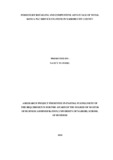| dc.description.abstract | Kenya's oil industry has several challenges like price controls have been introduced, the shilling has severely depreciated and interest rates have soared, and these have caused high cost of crude oil as well as an escalation in the sales' cost. The Kenya Petroleum Industry has witnessed immense turbulence in the recent past ranging from influx of new entrants and thus increased competition, changes in government policies on regulations, volatility of world market prices and exit of multinational corporations. This has necessitated the continuous need for oil marketing companies to come up with strategies and hence develop not temporary but sustained competitive advantage. The objective of this study was to establish the effect of forecourt retailing on competitive advantage at TKL. Since there are only 48 TKL service stations in Nairobi City County, all of them were selected for this study’s purpose. The study used primary data. Structured questionnaires were employed in collecting primary data using the Likert Scale. Primary data collected by the questionnaire underwent coding and then entered Statistical Package for Social Science. Descriptive statistics in form of frequencies and percentages were used to analyze the descriptive elements of the study. Correlations and regression analysis were calculated to draw inferences to the entire population. A simple linear regression model was used to analyze if an association exists between the dependent variable and the independent variable. The study found that forecourt retailing strategy had a positive and significant correlation with competitive advantage. From the regression results, the study found that forecourt retailing strategy and competitive advantage are positively and significantly related. The study also concluded that most service stations have been using food courts, pastry and baking, pharmaceutical outlets, shopping outlets and car wash services as forecourt retailing strategy to a great extent. The study recommends that all service stations should ensure that they use food courts, pastry and baking, pharmaceutical outlets, shopping outlets and car wash services as forecourt retailing strategy in a great extent. This will lead to the increased competitive advantage in the sector. | en_US |



